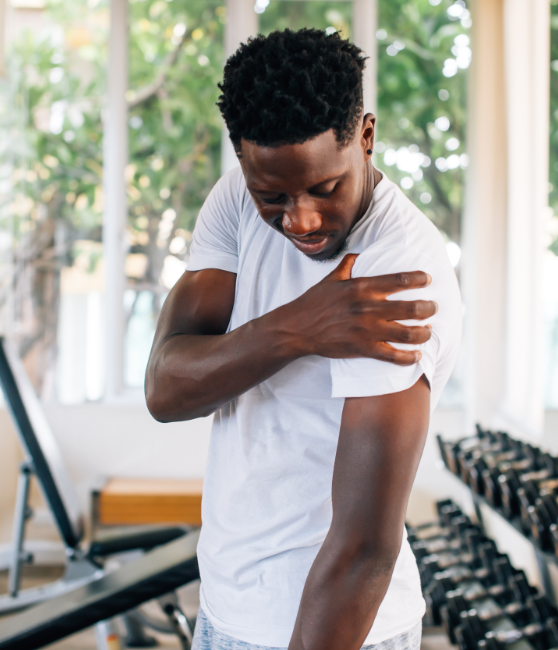How often have you experienced shoulder pain from everyday tasks such as putting on a shirt, fastening your seatbelt, or brushing your hair? Or maybe you’re experiencing stiffness and pain after your 80 pound Labrador yanked his way through a daily walk?
Nearly 8 million people a year experience a shoulder problem that requires medical attention.
It’s important to address your shoulder discomfort in a timely manner to prevent chronic symptoms. If left untreated, you may notice a decrease in shoulder strength and mobility, which can quickly impact your quality of life. The following lists common shoulder pain symptoms you shouldn’t ignore:
Chronic stiffness that worsens at night and early morning
Likely Cause: Osteoarthritis (OA)
Most commonly known as a “wear and tear” condition, OA is a common cause of shoulder pain due to its progressive nature. Overtime, the cartilage that cushions the area within our joint gradually breaks down resulting in stiffness, pain, and loss of mobility. According to the Arthritis foundation, approximately 1 in 3 people over 60 have shoulder OA. However, OA can affect much younger people too, especially those with prior joint injuries. So how can we treat this? Currently, there is no cure for OA, however it can be managed by medications, physical therapy, and surgery in severe cases. Losing weight has also been proven effective in slowing the progression of OA and reducing pain symptoms.
Extreme shoulder pain initially, followed by stiffness
Likely Cause: Frozen Shoulder
Frozen shoulder can develop after a shoulder has been immobilized for a period of time due to surgery, a fracture, or other injury. Moving your shoulder soon after injury or surgery is vital in the prevention of frozen shoulder. Failure to mobilize the shoulder early on may result in a longer healing period of up to 2 years or in severe cases, require surgery. Those at risk are most commonly women between the ages of 40 and 60 and people with diabetes are at increased risk as well. The go-to regimen for frozen shoulder is physical therapy centered on stretching exercises that improve shoulder mobility. That being said, if you suspect you have frozen shoulder, consider consulting with an orthopedic doctor to determine the best course of action for your symptoms.
Extreme shoulder pain when reaching overhead or behind your back
Likely Cause: Rotator Cuff Injury
The rotator cuff is one of the most critical parts of the shoulder joint. Comprised by four small muscles, the rotator cuff functions to hold the bones in the joint together and makes it possible for you to raise your arm above your head for daily functional tasks. Additional signs of rotator cuff injury include popping/clicking sounds or sensations, pain that worsens at night, and shoulder weakness when lifting items. Rotator cuff injuries are extremely common, especially in people over 40. A tear can happen suddenly from a fall, but more than often occurs gradually over time as the tendon wears down. Treatment depends on the severity of the tear, as partial tears can be treated by physical therapy, whereas full tears typically require surgery. It is crucial you see an orthopedic doctor if you suspect you have a rotator cuff injury to prevent further damage.
Dull ache in the shoulder that worsens when you move your arm up or to the side
Likely Cause: Bursitis
Bursitis happens when a small fluid-filled sac (bursa) becomes irritated and swells. Think of the bursa as bubble wrap—it cushions and protects objects from getting damaged—the bursa serves this same purpose in protecting the structure of our joint such as the muscles, tendons, and skin. Therefore, when it becomes irritated and swells, it induces pain, swelling, and limits our shoulder mobility. Repetitive motions—like a pitcher throwing a baseball or lifting heavy boxes at work—commonly cause shoulder bursitis. Other activities known to cause bursitis include, but are not limited to: carpentry, gardening, painting, and poor posture. Reducing the inflammation is the first step in the treatment plan. If ice packs and over-the-counter medication don’t get the job done, then treatment may involve physical therapy or joint injections.
Pain in the front and side of the shoulders that radiates toward the elbow
Likely Cause: Tendinitis
If you’ve had Swimmer’s Shoulder, Pitcher’s Shoulder, or Tennis Shoulder—you’ve had tendinitis. Like other shoulder conditions, tendinitis can be caused by a sudden injury, but generally results from long term repetitive use of the rotator cuff tendons. When the arm is raised, as commonly done with throwing, swimming, and playing racket sports, the archway comprised of bone and ligament becomes compressed, trapping the tendon against bones. This results in inflammation and pain felt at the tip of the shoulder or radiating down the arm. Aside from sports, tendinitis can be caused by weak muscles, strenuous training, an instable shoulder joint, improper technique, or previous injury. Depending on the severity, you may be able to treat tendinitis on your own (with ice, over-the-counter medications, and rest). If not, physical therapy can help strengthen the muscles around the damaged tendon and ultimately reduce your pain.
GETTING HELP FOR SHOULDER PAIN
So who should you be addressing your shoulder pain? In short, a good place to start is scheduling an appointment with an orthopedic doctor. This is because orthopedic doctors specialize in treating musculoskeletal injuries which involve our bones, joints, ligaments, nerves, and tendons. An orthopedic specialist can examine your shoulder and order imaging studies like X-rays, MRIs, or ultrasounds that can help diagnose your pain symptoms and develop a treatment regimen tailored to your specific needs.
Our shoulder specialists at Raleigh Orthopaedic are dedicated to achieving quality outcomes, and have many services available on-site to ensure that patients receive the most appropriate care for their orthopedic shoulder conditions. Our fellowship-trained physicians offer surgical and non-surgical treatments to get you back to your normal activities! Click here to book your appointment today.
If your injury or condition is recent, you can walk right into one of our Raleigh Orthopaedic Urgent Care locations for immediate care. For rehabilitation and physical therapy, no referral is needed to see one of our physical therapists.
– – – – – – –
The material contained on this site is for informational purposes only and DOES NOT CONSTITUTE THE PROVIDING OF MEDICAL ADVICE, and is not intended to be a substitute for independent professional medical judgment, advice, diagnosis, or treatment. Always seek the advice of your physician or other qualified healthcare providers with any questions or concerns you may have regarding your health.

